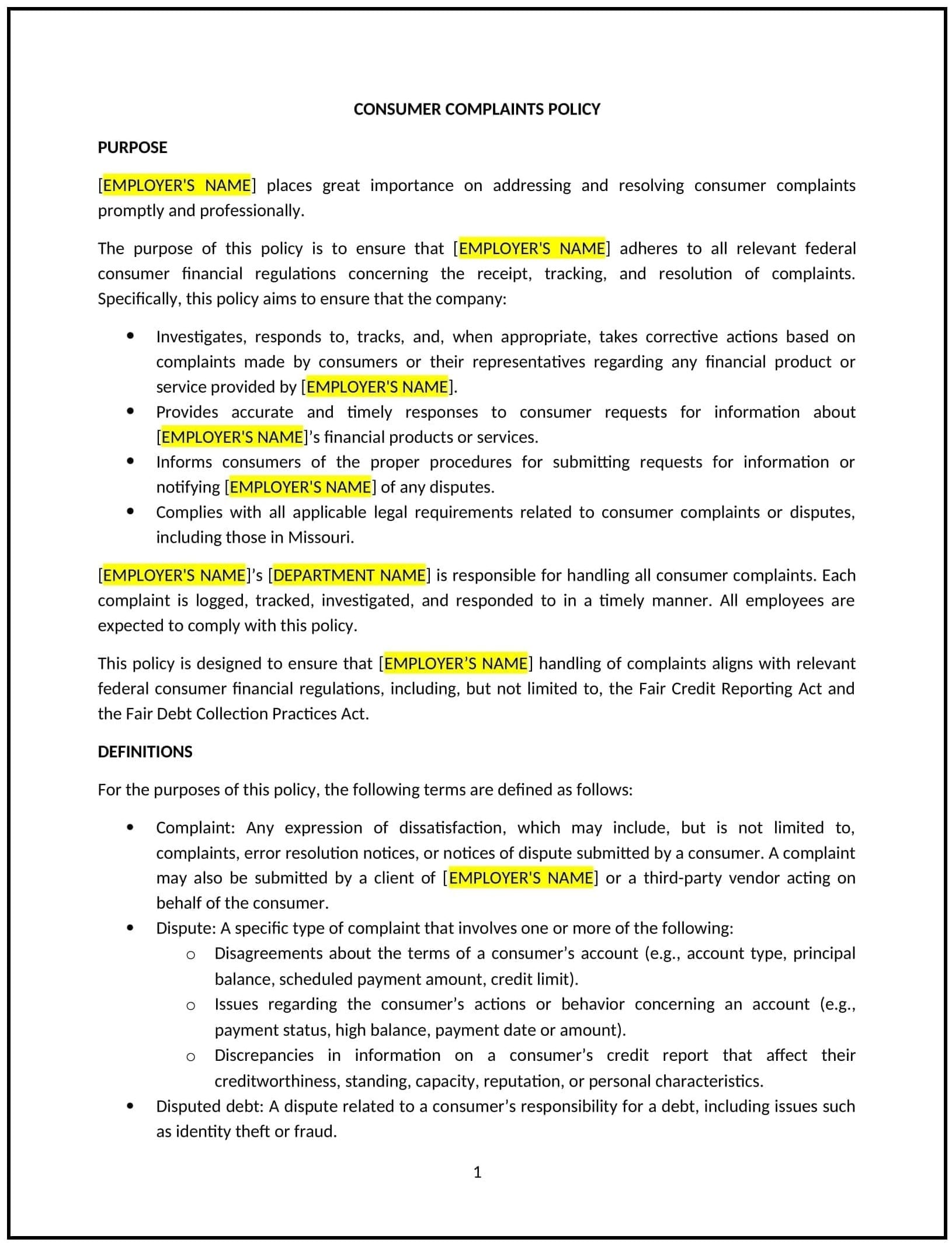Consumer complaints policy (Missouri): Free template
Got contracts to review? While you're here for policies, let Cobrief make contract review effortless—start your free review now.

Customize this template for free
Consumer complaints policy (Missouri)
A consumer complaints policy helps businesses in Missouri address and resolve customer complaints in a timely, fair, and professional manner. This policy outlines the steps consumers should follow to file a complaint, how the business will handle complaints, and the expected timelines for resolution. It is designed to enhance customer satisfaction, foster trust, and improve business operations by addressing issues proactively.
By adopting this policy, businesses in Missouri can improve customer relations, reduce potential legal risks, and demonstrate a commitment to high-quality customer service.
How to use this consumer complaints policy (Missouri)
- Define the complaint process: Clearly explain how consumers can file a complaint, including contact details, available channels (e.g., phone, email, online form), and required information.
- Acknowledge receipt of complaints: Set a timeline for acknowledging the receipt of complaints, ensuring customers know their concerns are being taken seriously.
- Investigate and resolve complaints: Outline the steps for investigating complaints, including gathering information, identifying the issue, and offering solutions.
- Communicate with consumers: Specify how the business will communicate with consumers during the complaint resolution process, including regular updates and final decisions.
- Set timelines for resolution: Define clear timelines for resolving complaints, ensuring that consumers receive timely responses and that issues are addressed promptly.
- Address escalation procedures: Provide details on how consumers can escalate complaints if they are not satisfied with the resolution, such as contacting a manager or filing with a regulatory body.
- Document and track complaints: Outline how complaints will be documented, tracked, and analyzed for future improvement opportunities.
- Review regularly: Periodically review the policy to ensure it reflects any changes in Missouri laws, business practices, or customer expectations.
Benefits of using this consumer complaints policy (Missouri)
This policy provides several benefits for businesses in Missouri:
- Enhances customer satisfaction: Addressing complaints promptly and professionally improves the customer experience and builds loyalty.
- Reduces legal risks: A well-structured complaints process helps minimize the risk of legal action by addressing consumer issues before they escalate.
- Strengthens brand reputation: Businesses that handle complaints effectively demonstrate a commitment to customer service, which can enhance their reputation and attract new customers.
- Improves operational efficiency: Tracking and analyzing complaints helps businesses identify trends, allowing for continuous improvement in products or services.
- Builds trust: A transparent complaints process shows that the business values customer feedback and is committed to resolving issues fairly.
- Aligns with Missouri’s consumer protection standards: This policy reflects Missouri’s consumer protection laws and demonstrates a commitment to adhering to state regulations.
Tips for using this consumer complaints policy (Missouri)
- Communicate the policy clearly: Ensure all customers are aware of the complaint process, especially through company websites, customer service teams, and product or service documentation.
- Handle complaints promptly: Respond to consumer complaints within the designated timeline, ensuring timely resolutions and maintaining customer trust.
- Offer multiple channels: Provide multiple ways for consumers to file complaints, including phone, email, social media, and website forms, to ensure accessibility.
- Stay transparent: Keep customers informed about the status of their complaint and any steps being taken to resolve the issue.
- Keep records: Maintain accurate records of complaints and resolutions for future reference and analysis to identify trends or systemic issues.
- Regularly review the policy: Periodically assess the effectiveness of the complaints process to ensure it remains relevant and effective in addressing customer concerns.